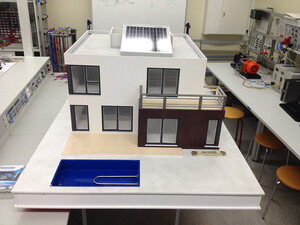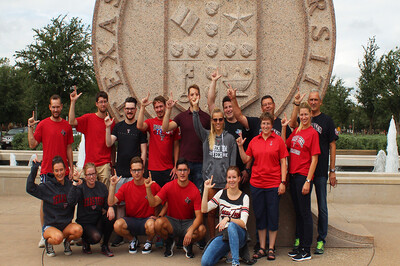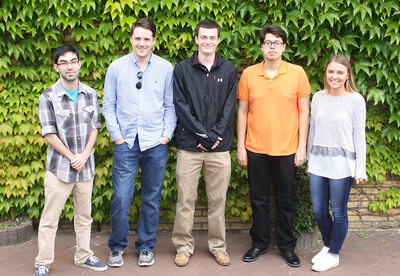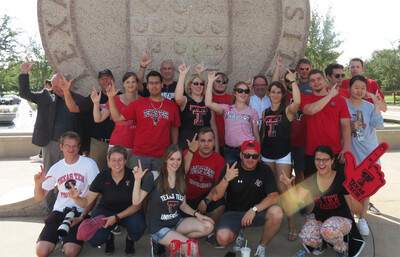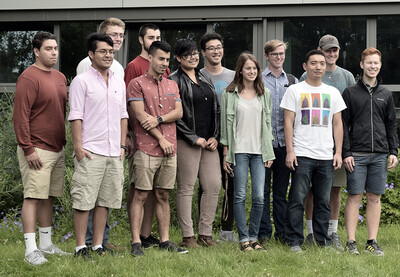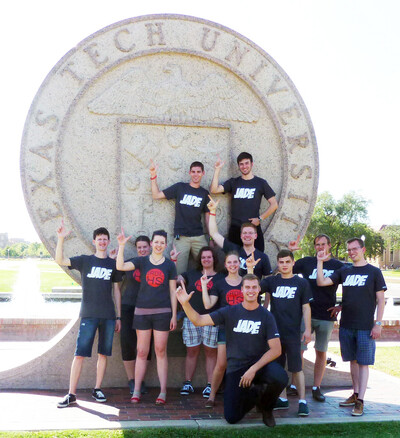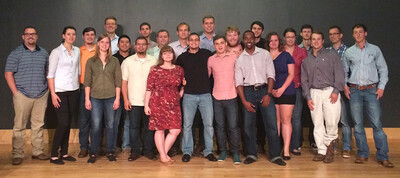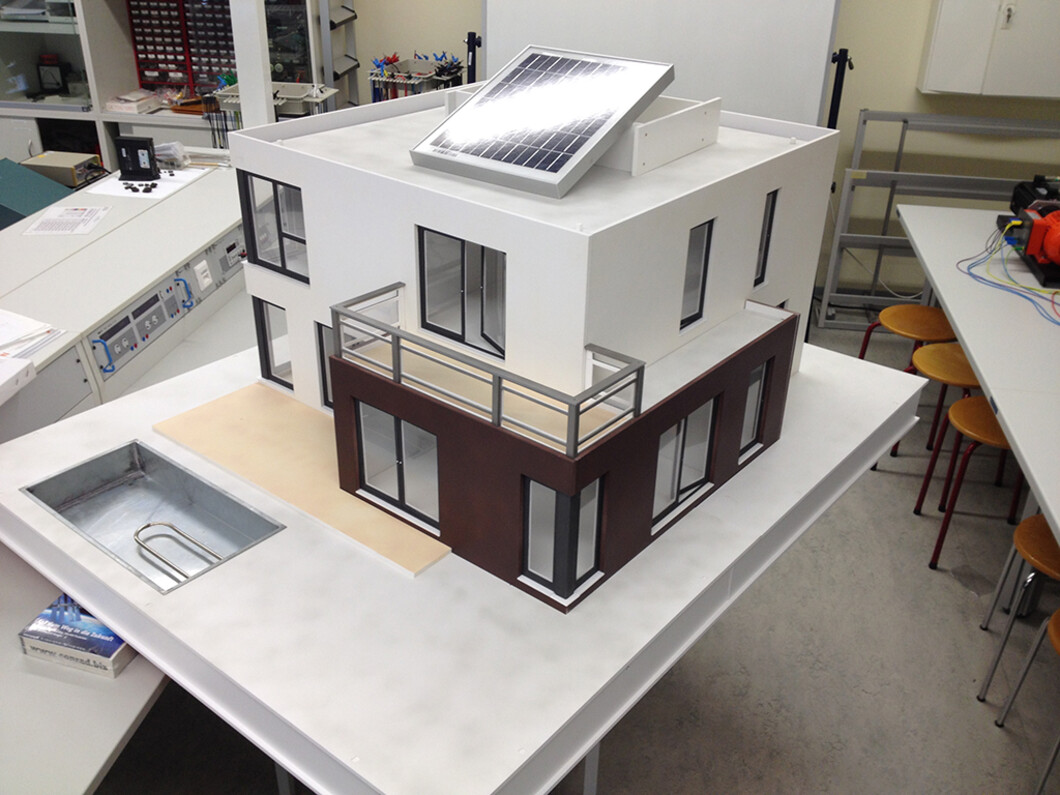Hinweis: Zur Zeit gibt es keine terminlichen Absprachen.
Deutsch-amerikanisches Projekt
Sommerprojekt
In Kooperation mit dem Edward E. Whitacre Jr. College of Engineering (Texas Tech University, Lubbock, USA) bieten die Fachbereiche Ingenieurwissenschaften und Management, Information und Technologie möglichst alle zwei Jahre ein Projekt an. Das Projekt findet in englischer Sprache statt. Es beinhaltet die Vorbereitung über Fernkontakt, einen 6-wöchigen Aufenthalt der TTU Studierenden in Deutschland und endet mit einer 2-wöchigen Exkursion der deutschen Studierenden zur Texas Tech University in die USA.
Informationsveranstaltungen dazu Anfang Sommersemester im März.
Geschichte
Die Geschichte des Projektes seit 2014 und Bilder.
2018 Exkursion Projekt 3
5. Exkursion zur TTU
Projekt "smart house model automation"
Teilnehmer:
- Prof. Dr. Josef Timmerberg FB-MIT
- Prof. Dr. Heiner Köster FB-I
- Dipl.-Ing. Paul Beckmann FB-MIT
- Dipl.-Ing. Nicole Sabrina Jesse FB-I
- Dipl.-Ing. Volker Lübben FB-I
- Regine Zink-Zimmerer B.A. FB-I
- 8 deutsche Studierende FB-I
- 8 deutsche Studierende FB-MIT
- TTU Dr. Michael G. Giesselmann Professor and Chair Dep. of Electrical and Computer Engineering
- TTU Allison Wright Program Manager, International Programs Oversees Europe
Besprechungen:
- George E. Spoth Executive Associate Dean - International Programs
- Zaida Gracia Assistant Academic Dean for International Programs
- Bethany Kuwitzky, Senior Study Abroad Advisor, Office of International Affairs
2018 Projekt 3
Organisation: Fachbereiche Ingenieurwissenschaften und Management, Information, Technologie
Dipl.-Ing. Volker Lübben
Dipl.-Ing. Paul Beckmann
Regine Zink-Zimmerer B.A.
Projekt "smart house model automation"
Teilnehmer:
- Prof. Dr. Josef Timmerberg FB-MIT
- Prof. Dr. Heiner Köster FB-I
- Prof. Dr. Folker Renken FB-I
- Dipl.-Ing. Paul Beckmann FB-MIT
- Dipl.-Ing. Nicole Sabrina Jesse FB-I
- Dipl.-Ing. Udo Schürmann FB-I
- 8 German students FB-I
- 8 German students FB-MIT
- 6 American students
- TTU Dr. Michael G. Giesselmann Professor and Chair Dep. of Electrical and Computer Engineering
2016 Exkursion Projekt 2
4. Exkursion zur TTU
Organisation: Fachbereiche Ingenieurwissenschaften und Management, Information, Technologie
Teilnehmer:
- Prof. Dr. Josef Timmerberg FB-MIT
- Prof. Dr. Heiner Köster FB-I
- Dipl.-Ing. Paul Beckmann FB-MIT
- Dipl.-Ing. Nicole Sabrina Jesse FB-I
- Dipl.-Ing. Volker Lübben FB-I
- 10 deutsche Studierende FB-I
- 6 deutsche Studierende FB-MIT
- Dr. Michael G. Giesselmann Professor and Chair Dep. of Electrical and Computer Engineering
- Projekt "smart house model automation"
Meetings:
- James Yang, Ph.D.
- Hong-Chao Zhang, Ph.D.
- Allison Wright Program Manager, International Programs Oversees Europe
- Brandon Weeks, Ph.D., Associate Dean of Research and Graduate Programs
- George E. Spoth Executive Associate Dean - International Programs
- Zaida Gracia Assistant Academic Dean for International Programs
- Bethany Kuwitzky, Senior Study Abroad Advisor, Office of International Affairs
- Richard Gale, Ph.D., P.E. Professor Elektrical and Computer Engineering
- Victoria Coverstone, Ph.D., Associate Dean for Undergraduate Studies
- Al Sacco Jr., Ph.D. Dean Edward E. Whitacre Jr. College of Engineering
- Audra N. Morse, Ph.D., P.E. Associate Dean for Undergraduate Studies and Professor
- Stephen Ekwaro‐Osire, Ph.D. Associate Dean of Research and Graduate Programs, Professor
2016 Projekt 2
Organisation: Fachbereiche Ingenieurwissenschaften und Management, Information, Technologie
Dipl.-Ing. Volker Lübben
Dipl.-Ing. Paul Beckmann
Projekt "smart house model automation"
Teilnehmer:
- Prof. Dr. Josef Timmerberg FB-MIT
- Prof. Dr. Heiner Köster FB-I
- Prof. Dr. Folker Renken FB-I
- Dipl.-Ing. Paul Beckmann FB-MIT
- Dipl.-Ing. Nicole Sabrina Jesse FB-I
- Dipl.-Ing. Udo Schürmann FB-I
- 10 German students FB-I
- 6 German students FB-MIT
- 12 American students
- Dr. Michael G. Giesselmann Professor and Chair Dep. of Electrical and Computer Engineering
2014 Exkursion Projekt 1
3. Exkursion zur TTU
Organisation: Fachbereich Ingenieurwissenschaften
Teilnehmer:
- Prof. Dr. Heiner Köster FB-I
- Dipl.-Ing. Paul Beckmann FB-MIT
- Dipl.-Ing. Volker Lübben FB-I
- 12 Studierende
- Projekt "Windenergie"
Meetings:
- Michael Johnson, International Agreements Administrator Office of International Affairs
- Audra N. Morse, Ph.D., P.E. Associate Dean for Undergraduate Studies and Professor
- Stephen Ekwaro‐Osire, Ph.D. Associate Dean of Research and Graduate Programs, Professor
- Andy Swift, Sc.D. Associate Director, Education, National Wind Institute
- Matt Saldana Instructor of Wind Energy, National Wind Institute
- Kacey Young Advisor, Wind Energy, National Wind Institute
- Richard Gale, Ph.D., P.E. Professor Elektrical and Computer Engineering
2014 Projekt 1
Organisation: Fachbereich Ingenieurwissenschaften
Dipl.-Ing. Volker Lübben
Dipl.-Ing. Paul Beckmann
Projekt "Windenergie"
Teilnehmer:
- Prof. Dr. Heiner Köster FB-I
- Dipl.-Ing. Paul Beckmann FB-MIT
- Dipl.-Ing. Volker Lübben FB-I
- 12 amerikanische Studierende
- 12 Studierende FB-I
- TTU Andy Swift, Sc.D. Associate Director, Education, National Wind Institute
- TTU Matt Saldana Instructor of Wind Energy, National Wind Institute
- TTU Kacey Young Advisor, Wind Energy, National Wind Institute
Projektbeschreibung
Projektbeschreibung
Das Projekt startet im März/April und endet dann im September. Ca. 16 Studierende von der Texas Tech University und 16 Studierende der Jade Hochschule arbeiten im Projekt zusammen. Nach der Vorbereitungszeit März bis Juni setzt die gemischte deutsch-amerikanische Gruppe im Juli/August 6 Wochen an der Jade Hochschule die Arbeit zusammen im Projekt fort. Nach der vorbereitenden Theorie und Konzeption des Projektes arbeiten sie am Beispiel eines smart house models in internationalen Gruppen von 3-6 Studierenden an Teilprojekten, in denen sie spezielle Aufgaben planen, realisieren, programmieren und dokumentieren.
Anrechnung:
Fachbereich Ingeneurwissenschaften:
- Im 30 ECTS Wahlpflichtblock Bachelor als "Projekt International groß" mit 10 ECTS und Projektbezeichnung auf dem Zeugnis.
Fachbereich Management, Information, Technologie:
- Die Anrechenbarkeit wird in einem Beschluss der Prüfungskommission im Sommersemester geregelt.
Der Maßstab des Hauses ist 1:10. Das Haus hat zwei Etagen, einen Pool und ist mit vielfältiger Technik ausgestattet.
Da die Studierenden unterschiedliche Vorkenntnisse haben, finden vor dem Start während der ersten 2 Wochen Vorlesungen statt, um eine gemeinsamen Startpunkt zu bekommen. Sinnvoll sind dafür Vorkenntnisse aus Kursen wie:
- Grundlagen der Elektrotechnik und Elektronik, Elektrische Schaltungen
- Grundlagen der Datenverarbeitung und Programmierung
- Grundlagen der Regelungstechnik
In den Wochen 3 bis 6 legen die Studierenden den Projektplan fest, definieren Arbeitspakete und bearbeiten dann den praktischen Teil des Projektes mit der zugehörigen Dokumentation.
Beteiligte:
Dipl.-Ing. Paul Beckmann
Fachbereich Management, Information Technologie - Organisation, Vorlesungen, Laborbetreuung
Jan Dierks B.Eng.
Fachbereich Ingenieurwissenschaften, Laborbetreuung
Prof. Dr.-Ing. Heiner Köster
Fachbereich Ingenieurwissenschaften - Organisation
Dipl.-Ing. Jörg Meyer
Fachbereich Ingenieurwissenschaften - Simulationen
Harald Musa M.Eng.
Fachbereich Ingenieurwissenschaften - Vorlesungen, Übungen
Prof. Dr. Folker Renken
Fachbereich Ingenieurwissenschaften - Vorlesung
Prof. Dr. Josef Timmerberg
Fachbereich Management, Information Technologie - Organisation, Vorlesungen, Laborbetreuung
Detailierte Aufgaben der Teilgruppen
Detailierte Teilprojektbeschreibungen. Nur in Englisch verfügbar.
Group A - Heating Pool
Control the water temperature in the outdoor pool. Different power controllers and controller strategies are to be tested. For state‐of‐the‐art controls, operation should also be possible via mobile phone.
Plan of procedures:
subgroup 1:
- measure the step function response of the control process (without the module of subgroup 2)
- build the mathematical model from the step function response
- simulate (Scilab, Xcos) the control process with the mathematical model
subgroup 2:
- analyse an existing phase controlled modulator for the pool heating
- simulate the circuit with LT‐Spice
- test the existing hardware
- analyse an pulse packet controller for the pool heating
- simulate the circuit with LT‐Spice
- test the existing hardware
Both
- control unit design (with the math. model and the frequency response characteristic)
- simulation of the overall system
- programming the controller with Arduino
- measure the step function response of the overall system and make the presentation and a movie
- create the mathematical model with physical knowledge and compare it with that of measurement
- calculate the frequency response characteristic from the step function response
- simulate (Scilab, Xcos) the control process with the mathematical model and the frequency response characteristic
- create the presentation and documentation and make a movie
Group B: App Development
Combine all values gathered by other groups via MQTT in an Unity Application. This Application should also be capable of sending values to other groups.
Plan of procedures:
- Draw a possible interface consisting of User Interface components (2D)
- Develop possible scenes, keep them as generic as possible
- Research a suitable MQTT Library
subgroup 1:
- Build interface for 2 other groups (Elevator and Object Detection / Movement)
- ask them for possible in‐ and outputs
- Add word recognition
subgroup 2:
- Build interface for 2 other groups (Pool Heating and Photovoltaic)
- ask them for possible in‐ and outputs
- Build an interface which is able to display developments over time
Both
- split source code in reusable functions
- document source code
- document use cases and program in one (or more) Flowcharts
- create the presentation and documentation and make a movie
Group C: Elevator
Control the external elevator attached to the house.
Plan of procedures:
- Research on different elevator dispatch mechanism
- Summarize possible sequences
- Control the motor using an Arduino
- Use Sensors to locate the elevator
- Add security features
- Broadcast values via MQTT
- Add buttons and displays
- document source code
- document use cases and program in one (or more) Flowcharts
- create the presentation and documentation and make a movie
Group D: Photovoltaics
Supply the house with renewable energy by a PV system. The renewable energy system should consist of the solar module, an accumulator and a controller, which also contains an mpp‐tracker. For state‐of‐the‐art controls, operation should also be possible via mobile phone.
Plan of procedures:
- plan the energy supply of the house model – energy independent / grid independent
- create an energy supply with "normal" components: PV panel, battery, ..
- measure the characteristic curves I(U) and P(U) of the PV panels
- dimension the battery
- create a concept of a mpp‐controller
subgroup 1:
- analyse the existing control hardware and the existing mpp tracker with LT‐Spice and test it
subgroup 2:
- develop the software for the Arduino
- test the software with the simulation of the PV‐panel
Both
- join the hardware and the software
- test the whole system, draw characteristic curves
- create the presentation and documentation and make a movie
Group E: Optical Movement and Shape Recognition
Signal, if a special car as ambulance or fire truck enters the estate of the house. For state‐of‐the‐art controls, operation should also be possible via mobile phone.
Group E1: Signal, if any person or animal is in the garden or at the entry door, if nobody is at home.
Group E2: Signal, if a special car as ambulance or fire truck enters the estate of the house.
For state‐of‐the‐art controls, operation should also be possible via mobile phone.
Plan of procedures
- configure a Raspberry Pi 3 including a camera
- getting started with Python
- analyse the data from of camera (picture format, compression, origin, ...)
- adjust the resolution by your own procedure and find the optimal value
- practise image processing: colour reduction to grey/b‐w
- practise image processing: rotate, translate, mirror, scale, edge detection (if time)
- handle the effect of changing the intensity of illumination ‐ offset reduction
- if necessary: filter methods
subgroup 1 Optical Movement Recognition:
- empirical approach
- correlation approach
- difference method
subgroup 2 Optical Shape Recognition:
- practise picture segmentation = thresholding
- edge and corner detection such as Canny Edge Detection, Moravec’s Corner Detector
- AND/OR edge and corner detection such as Sobel Edge Detection, Harris Corner Detector
- Hough‐Transformation for a straight line
Both
- compare and discuss your results of both groups
- document used methods and program
- create the presentation and documentation and make a movie
Projektablauf März - September- Inhalte folgen!
Projektexkursion September - Inhalte folgen!
Zum Projekt gehört eine Exkursion in die USA zur Partnerhochschule.
Das deutsch-amerikanische Projekt schließt mit einer Exkursion in die USA ab. Nur wer am Projekt teilnimmt, kann auch an der Exkursion teilnehmen. Ohne die Teilnahme an der Exkursion kann das deutsch-amerikanische Projekt nicht erfolgreich abgeschlossen werden.
Voraussetzungen:
-
Gute bis sehr gute Englischkenntnisse
-
Übernahme eines Eigenanteils für die Reise in Höhe von 500,- Euro
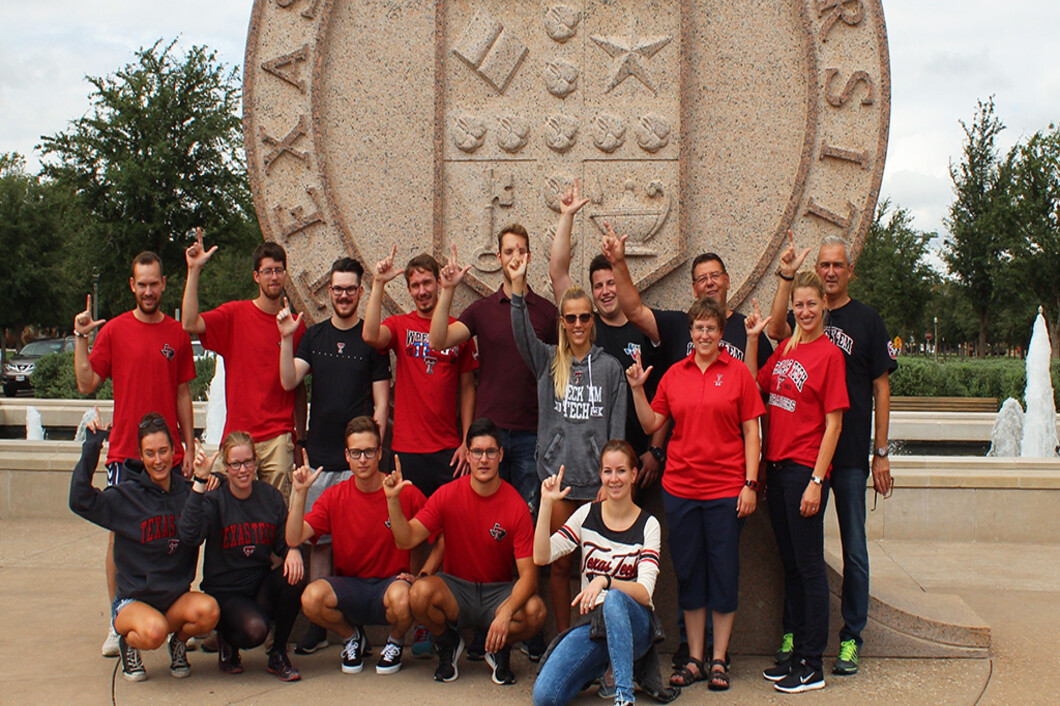
Die Exkursion dient auch zum Kennenlernen der Partnerhochschule, um eine Entscheidung für ein späteres Studium dort besser fällen zu können.
Firmenbesuche (Lubbock, Dallas, New York) und Besuche von kulturellen Einrichtungen und Veranstaltungen während der Exkursion runden das internationale Projekt mit erweiterten Kenntnissen in der internationalen Projektbearbeitung und dem Kennenlernen der USA ab.
Ein abschließender englischsprachiger Exkursionsbericht wird von den Studierenden gemeinsam erstellt und dem Präsidium der Jade Hochschule zur Verfügung gestellt. Der Exkursionsbericht wird auf den Webseiten der Jade Hochschule in geeigneter Form veröffentlicht.
Downloads
Download Inhalt syllabus 3 cts TTU theoretischer Teil 1 smart home project (300kB)
Download Inhalt syllabus 3 cts TTU praktischer Teil 2 smart home project (300kB)
Download der englischen pdf-Präsentation Projekt (6MB)
Download der englischen Powerpoint-Präsentation Projekt (28MB)
Kontakt und Bewerbung
Bachelor-Studierende der Jade Hochschule, die
- ein Projekt in einer Gruppe mit amerikanischen Studierenden absolvieren möchten
- ihre interkulturelle Kompetenz schulen möchten
- Elektrotechnik, Kommunikations- und Informationstechnik, Maschinenbau, Maschinenbau-Informatik, Mechatronik, Medizintechnik, Meerestechnik, Wirtschaftsingenieurwesen oder Wirtschaftsinformatik mindestens im dritten Fachsemester studieren
können sich für die Teilnahme bewerben. Informationsveranstaltungen finden im jeweils im Dezember und März statt. Sie können sich für Fragen aber jederzeit an die Ansprechpartner unten wenden. In speziellen Moodlekursen werden später Informationen zum Projekt und zur Exkursion bereitgestellt.
Kontakt:
Fachbereich Ingenieurwissenschaften
Fachbereich Management, Information, Technologie
Wenn Sie teilnehmen möchten, können Sie sich NACH den Informationsveranstaltungen für die Teilnahme bewerben:
-
Online Bewerbung - NOCH NICHT GEÖFFNET!
Benötigt werden: persönliche Daten mit Motivationsschreiben und Auszug der Notenleistungskartei
Nach Bewerbungsschluss:
-
Sichtung und Auswertung der Bewerbungen.
-
Mitteilung über die Teilnahme.
-
Gegebenenfalls Warteliste.
-
Abfrage der Teilprojekte für Gruppenbildung


